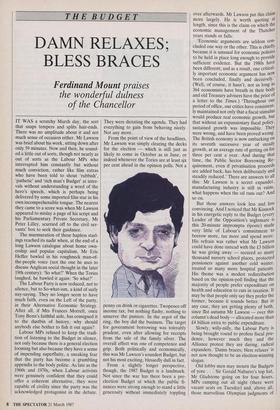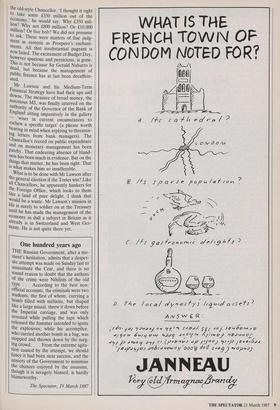THE BUDGET
DAMN RELAXES; BLESS BRACES
Ferdinand Mount praises the wonderful dulness of the Chancellor
IT WAS a scratchy March day, the sort that snaps tempers and splits hair-ends. There was no amplitude about it and not much sense of occasion either. Mr Lawson was brief about his work, sitting down after only 59 minutes. Now and then, he sound- ed a little out of sorts, though not nearly as out of sorts as the Labour MPs who interrupted him constantly but without much conviction, rather like film extras who have been told to shout 'rubbish', `pathetic' and 'rich man's Budget' at inter- vals without understanding a word of the hero's speech, which is perhaps being delivered by some imported film star in his own incomprehensible tongue. The nearest they came to a score was when Mr Lawson appeared to mislay a page of his script and his Parliamentary Private Secretary, Mr Peter Lilley, scurried off to the civil ser- vants' box to seek their guidance.
The murmuration of these hapless starl- ings reached its nadir when, at the end of a long Lawson catalogue about home own- ership and popular capitalism, Mr Eric Heifer bawled in his roughneck man-of- the-people voice (not the one he uses to discuss Anglican social thought in the later 19th century): 'So what?' When the Tories laughed, he bawled it again: 'So what?'
The Labour Party is now reduced, not to silence, but to So-what-ism, a kind of surly nay-saying. They no longer seem to have much faith, even on the Left of the party, in their Alternative Economic Strategy. After all, if Mrs Frances Morrell, once Tony Benn's faithful aide, has consigned it to the dustbin of history, why should anybody else bother to fish it out again?
Labour MPs refused to keep the tradi- tion of listening to the Budget in silence, not only because there is a general election looming but also because they have a sense of impending superfluity, a sneaking fear that the party has become a grumbling appendix to the body politic. As late as the 1960s and 1970s, when Labour activists were genuinely confident that they could offer a coherent alternative, they were capable of civility since the party was the acknowledged protagonist in the debate. They were dictating the agenda. They had everything to gain from behaving nicely. Not any more.
From the point of view of the headlines, Mr Lawson was simply clearing the decks for the election — which is still just as likely to come in October as in June, or indeed whenever the Tories are at least six per cent ahead in the opinion polls. Not a penny on drink or cigarettes. Twopence off income tax, but nothing flashy, nothing to unnerve the punters. In the argot of the ring, the boy did the business. The target for government borrowing was tolerably prudent, even after allowing for receipts from the sale of the family silver. The overall effect was one of competence and grip. Both politically and economically, this was Mr Lawson's soundest Budget, but not his most exciting, blessedly dull in fact.
From a slightly longer perspective, though, the 1987 Budget is a landmark. Not since the war has there been a pre- election Budget at which the public fi- nances were strong enough to stand a little generosity without immediately toppling over afterwards. Mr Lawson put this claim more largely. He is worth quoting at length, since this is the claim on which the economic management of the Thatcher years stands or falls: `Economic arguments are seldom con- cluded one way or the other. This is chiefly because it is unusual for economic policies to be held in place long enough to provide sufficient evidence. But the 1980s have been different; and as a result, one critical- ly important economic argument has now, been concluded, finally and decisively.' (Well, of course, it hasn't, not as long as 364 economists have breath in their body and old Treasury advisers have the price of a letter to the Times.) 'Throughout our period of office, our critics have consistent- ly maintained not only that a fiscal stimulus would produce real economic growth, but that without an expansionary fiscal policy, sustained growth was impossible. They were wrong, and have been proved wrong. The British economy is now embarking on its seventh successive year of steady growth, at an average rate of getting on for three per cent a year. And during that time, the Public Sector Borrowing Re- quirement, even if privatisation proceeds are added back, has been deliberately and steadily reduced.' There are answers to all this: Mr Lawson is a secret expander, manufacturing industry is still in ruins, what happens when the oil runs out? And so on.
But those answers look less and less convincing. And I noticed that Mr Kinnock in his energetic reply to the Budget (every Leader of the Opposition's nightmare is this 20-minute impromptu riposte) made very little of Labour's commitment to borrow more, tax more and spend more. His refrain was rather what Mr Lawson could have done instead with the £3 billion he was giving away — secured so many thousand nursery school places, protected pensioners against another cold winter, treated so many more hospital patients. His theme was a modest redistribution based on the opinion-poll finding that the majority of people prefer expenditure on health and education to cuts in taxation. It may be that people only say they prefer the former, because it sounds better. But in any case, they are getting plenty of both, since last autumn Mr Lawson — over this column's dead body — allocated more than £4 billion extra to public expenditure. Slowly, willy-nilly, the Labour Party is being brought round to profess fiscal pru- dence, however much they and the Alliance protest they are daring, radical expanders. 'Damn braces; bless relaxes' is not now thought to be an election-winning slogan.
Old lobby men may mourn the Budgets of yore . . . Sir Gerald Nabarro's top hat, Mr Gladstone going on for four hours, MPs camping out all night (there were vacant seats on Tuesday) and, above all, those marvellous Olympian judgments of the old-style Chancellor. 'I thought it right to take some £350 million out of the economy,' he would say. Why £350 mil- lion? Why not £800 million? Or £10,000 million? Or five bob? We did not presume to ask. These were matters of fine judg- ment as esoteric as Prospero's enchant- ments. All that insubstantial pageant is now faded. The excitement of Budget Day, however spurious and pernicious, is gone. This is not because Sir Gerald Nabarro is dead, but because the management of public finance has at last been decaffein- ated.
Mr Lawson and his Medium-Term Financial Strategy have had their ups and downs. The measure of broad money, the notorious M3, was finally interred on the authority of the Governor of the Bank of England sitting impassively in the gallery 'wiser in current circumstances to eschew a specific target' (a phrase worth bearing in mind when replying to threaten- ing letters from bank managers). The Chancellor's record on public expenditure and on monetary management has been patchy. That endearing absence of bland- ness has been much in evidence. But on the things that matter, he has been right. That Is what makes him so insufferable.
What is to be done with Mr Lawson after the general election if the Tories win? Like all Chancellors, he apparently hankers for the Foreign Office, which looks to them like a land of pure delight. I think that would be a waste. Mr Lawson's mission in life is surely to soldier on at the Treasury until he has made the management of the economy as dull a subject in Britain as it already is in Switzerland and West Ger- many. He is not quite there yet.



















































 Previous page
Previous page